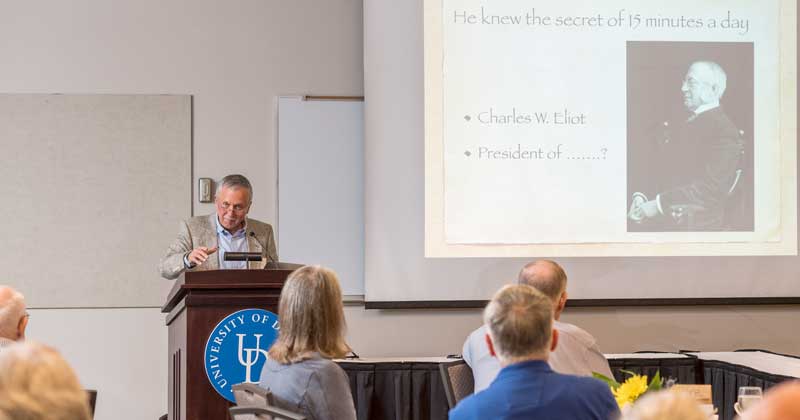


Shortcuts in American education
Photo by Kathy F. Atkinson October 05, 2018
UD professor Robert Hampel shares insights from his new book at UDARF Luncheon
Who doesn’t love a useful shortcut?
Robert Hampel, a historian and professor at the University of Delaware’s School of Education, tackles shortcuts in his latest book, Fast and Curious, A History of Shortcuts in American Education. He discussed his book and educational shortcuts on Oct. 2 during a luncheon for the UD Association of Retired Faculty (UDARF).
“Looking at the title of the book, you might think, ‘Well, this explains what’s wrong with American education,’” Hampel said. “That in the last century we’ve gone from the Harvard Classics to relying on CliffsNotes, but I hope my comments today suggest that things aren’t that awful. In many ways, shortcuts are an effort to find help from a trustworthy source.”
Hampel led the UDARF audience through a discussion on the link between culture and education. He explained for those wishing to learn a trade or become an expert in any subject matter, there exist many resources promising fast and easy success.
As an example, he turned to the early 1900s when the Harvard Universal Classics book set was released. Then-Harvard President Charles William Eliot worked with a colleague to create this collection of what they saw as the best literature. Eliot suggested that reading from the collection for just 15 minutes a day would provide a consumer with a higher education. According to Harvard Magazine, 350,000 sets were sold during the first 20 years they were available.
Another example Hampel noted was the work of Will and Ariel Durant, a married team that created their own book set on Western history. Hampel explained that Durant poked fun at highbrow literature and sold his set on the claims that it was more down to earth for the general reader.
Of course there were critics, like historian John H. Plum who said these shortcuts were outright scams. Hampel quoted Plum’s analogy on the philosophy behind book sets: “This is to cheese what cheese spread is. Little taste, boring and bulk. Easy to use and very remote from the real thing.”
Hampel said trying for the quick fix to get an education is an idea that comes up again and again. From correspondence programs to online services like SparkNotes, the importance of education in American culture has helped brew this pattern. Although many would agree obtaining an education can take a lot of work, shortcuts attempted to promise the same outcomes, but faster and easier, while more useful, affordable and fun.
Hampel said his view is not all cynical, but the remainder of the book weighs both sides of the impact of shortcuts on education.
“Shortcuts, I think, are everywhere,” Hampel said, “and part of the challenge is to be an informed consumer, to be aware of when the shortcut has some credibility and when it is too easy, too fast and not truly legitimate.”
A final goodbye to Frank Murray
Marian Palley, UDARF past president, took a few moments to remember Frank Murray. Dr. Murray was of professor at UD and served as dean of what was then called the College of Education.
He passed away after a sudden illness on Friday, Sept. 14, at the age of 79. Last semester, he was elected to be the incoming president of UDARF.
Palley said Dr. Murray was a good friend and his passing was a shock.
“He was a great scholar and he was a nationally recognized scholar — it wasn’t just that he was recognized here at UD,” Palley said. “He was a wonderful scholar, he was a wonderful friend, he was a wonderful husband to Fiona and father to their children and we’re going to miss him.”
Palley who was UDARF president for the 2016-18 term, will serve as temporary acting president until a new person is selected.
Contact Us
Have a UDaily story idea?
Contact us at ocm@udel.edu
Members of the press
Contact us at 302-831-NEWS or visit the Media Relations website

